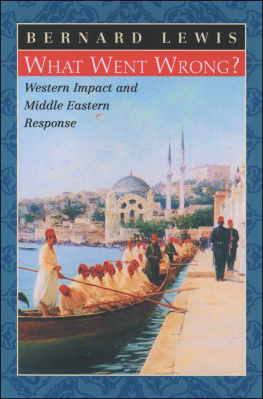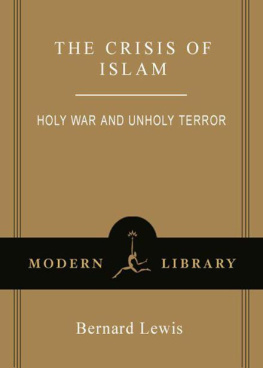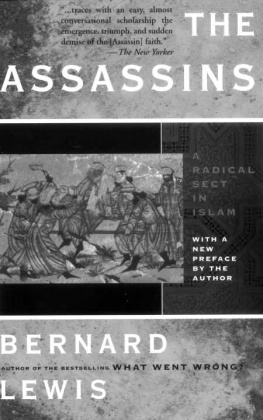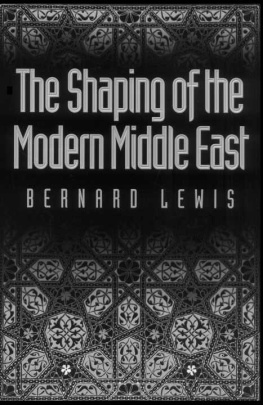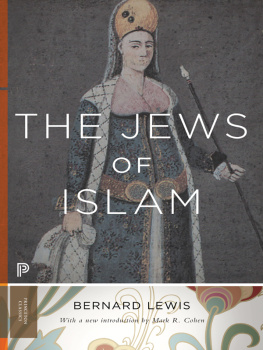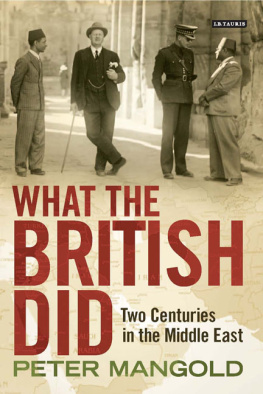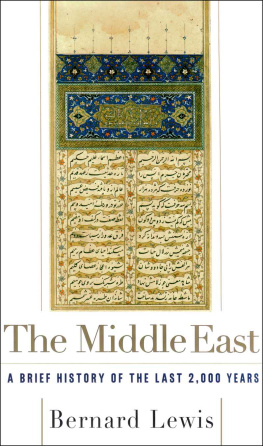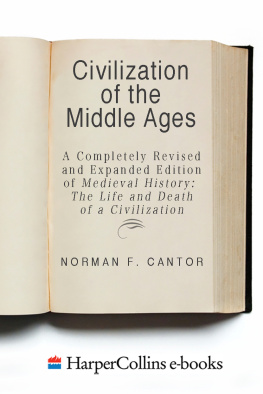What Went Wrong?
What Went Wrong?
Western Impact and Middle Eastern Response
Bernard Lewis


Oxford New York
Athens Auckland Bangkok Bogot Buenos Aires
Cape Town Chennai Dar es Salaam Delhi Florence
Hong Kong Istanbul Karachi Kolkata Kuala Lumpur Madrid
Melbourne Mexico City Mumbai Nairobi Paris So Paulo
Shanghai Singapore Taipei Tokyo Toronto Warsaw
and associated companies in
Berlin Ibadan
Copyright 2002 by Bernard Lewis
Published by Oxford University Press, Inc.
198 Madison Avenue, New York, New York 10016
Oxford is a registered trademark of Oxford University Press
All rights reserved. No part of this publication may be reproduced,
stored in a retrieval system, or transmitted, in any
form or by any means, electronic, mechanical, photocopying, recording, or otherwise,
without the prior permission of Oxford University Press.
Library of Congress Cataloging-in-Publication Data
Lewis, Bernard.
What went wrong? : western impact and Middle Eastern
response / Bernard Lewis.
p. cm.
Includes bibliographical references and index.
ISBN 0-19-514420-1 1.
Middle EastHistory1517- I. Title.
DS62.4.L488 2000
956.015dc21 2001036214
Printing (last digit): 1 3 5 7 9 8 6 4 2
Printed in the United States of America
on acid-free paper
Contents
Chapter 1
The Lessons of the Battlefield
Chapter 2
The Quest for Wealth and Power
Chapter 3
Social and Cultural Barriers
Chapter 4
Modernization and Social Equality
Chapter 5
Secularism and the Civil Society
Chapter 6
Time, Space, and Modernity
Chapter 7
Aspects of Cultural Change
Preface
This book was already in page proof when the terrorist attacks in New York and Washington took place on September 11, 2001. It does not therefore deal with them, nor with their immediate causes and after-effects. It is however related to these attacks, examining not what happened and what followed, but what went beforethe longer sequence and larger pattern of events, ideas, and attitudes that preceded and in some measure produced them.
B.L.
Princeton, N.J.
October 15, 2001
Introduction
What went wrong? For a long time people in the Islamic world, especially but not exclusively in the Middle East, have been asking this question. The content and formulation of the question, provoked primarily by their encounter with the West, vary greatly according to the circumstances, extent, and duration of that encounter and the events that first made them conscious, by comparison, that all was not well in their own society. But whatever the form and manner of the question and of the answers that it evokes, there is no mistaking the growing anguish, the mounting urgency, and of late the seething anger with which both question and answers are expressed.
There is indeed good reason for questioning and concern, even for anger. For many centuries the world of Islam was in the forefront of human civilization and achievement. In the Muslims own perception, Islam itself was indeed coterminous with civilization, and beyond its borders there were only barbarians and infidels. This perception of self and other was enjoyed by most if not all other civilizationGreece, Rome, India, China, and one could add more recent examples.
In the era between the decline of antiquity and the dawn of modernity, that is, in the centuries designated in European history as medieval, the Islamic claim was not without justification. Muslims were of course aware that there were other, more or less civilized, societies on earth, in China, in India, in Christendom. But China was remote and little known; India was in process of subjugation and Islamization. Christendom had a certain special importance, in that it constituted the only serious rival to Islam as a world faith and a world power. But in the Muslim view, the faith was superseded by the final Islamic revelation, and the power was being steadily overcome by the greater, divinely guided power of Islam.
For most medieval Muslims, Christendom meant, primarily, the Byzantine Empire, which gradually became smaller and weaker until its final disappearance with the Turkish conquest of Constantinople in 1453. The remoter lands of Europe were seen in much the same light as the remoter lands of Africaas an outer darkness of barbarism and unbelief from which there was nothing to learn and little even to be imported, except slaves and raw materials. For both the northern and the southern barbarians, their best hope was to be incorporated in the empire of the caliphs, and thus attain the benefits of religion and civilization.
For the first thousand years or so after the advent of Islam, this seemed not unlikely, and Muslims made repeated attempts to accomplish it. In the course of the seventh century, Muslim armies advancing from Arabia conquered Syria, Palestine, Egypt, and North Africa, all until then part of Christendom, and most of the new recruits to Islam, west of Iran and Arabia, were indeed converts from Christianity. In the eighth century, from their bases in North Africa, Arab Muslim forces, now joined by Berber converts, conquered Spain and Portugal and invaded France; in the ninth century they conquered Sicily and invaded the Italian mainland. In 846 C.E. a naval expedition from Sicily even entered the River Tiber, and Arab forces sacked Ostia and Rome. This provoked the first attempts to organize an effective Christian counterattack. A subsequent series of campaigns to recover the Holy Land, known as the Crusades, ended in failure and expulsion.
In Europe, Christian arms were more successful. By the end of the eleventh century the Muslims had been expelled from Sicily, and in 1492, almost eight centuries after the first Muslim landing in Spain, the long struggle for the reconquest ended in victory, opening the way to a Christian invasion of Africa and Asia. But meanwhile there were other Muslim threats to European Christendom. In the East, between 1237 and 1240 C.E., the Tatars of the Golden Horde conquered Russia; in 1252 the Khan of the Golden Horde and his people were converted to Islam. Russia, with much of Eastern Europe, was subject to Muslim rule, and it was not until the late fifteenth century that the Russians finally freed their country from what they called the Tatar yoke. In the meantime a third wave of Muslim attack had begun, that of the Ottoman Turks, who conquered Anatolia, captured the ancient Christian city of Constantinople, invaded and colonized the Balkan peninsula, and threatened the very heart of Europe, twice reaching as far as Vienna.

Fig. I-1 The Bosphorus with the Castles of Europe and Asia by Thomas Allum
At the peak of Islamic power, there was only one civilization that was comparable in the level, quality, and variety of achievement; that was of course China. But Chinese civilization remained essentially local, limited to one region, East Asia, and to one racial group. It was exported to some degree, but only to neighboring and kindred peoples. Islam in contrast created a world civilization, polyethnic, multiracial, international, one might even say intercontinental.
Next page
